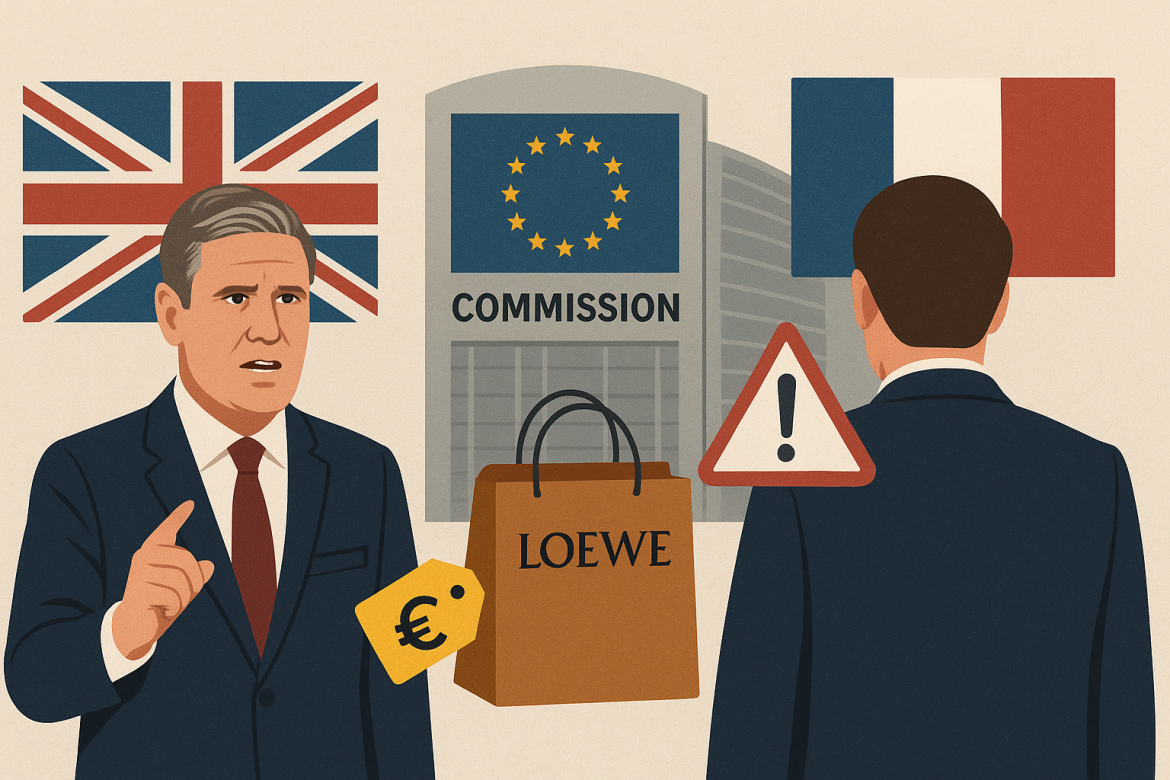Tuesday brought a series of high-impact political and regulatory developments across Europe — from renewed diplomatic ambitions in the Middle East to fresh warnings of espionage and major economic concessions in France.
The European Commission also delivered a sharp rebuke to the luxury fashion industry with multimillion-euro antitrust fines.
Starmer sees “first real chance” for Middle East peace
British Prime Minister Keir Starmer told Parliament on Tuesday that the two-state solution between Israel and Palestine now has its “first real chance” of being implemented since the Oslo Accords of the 1990s.
Speaking before the House of Commons, Starmer said the UK would play an active role in supporting peace efforts, offering its expertise in “three areas: supporting the reconstruction in Gaza, supporting transitional arrangements, and ensuring security for a ceasefire monitoring process.”
“This is the first real chance we’ve had on a two-state solution since the Oslo Accords over three decades ago,” Starmer said.
“So we are fully committed to this because a safe and secure Israel, alongside a viable Palestinian state, is the only way to secure lasting peace for the Middle East.”
He credited the recent pause in Gaza’s bombardment and the entry of humanitarian aid to a peace initiative led by US President Donald Trump.
EU fines Gucci, Chloé, and Loewe
The European Commission on Tuesday fined Gucci, Chloé, and Loewe a combined €157 million for violating EU competition rules by restricting how retailers priced their products.
The investigation found that the luxury brands — owned respectively by Kering SA, Richemont SA, and LVMH SE — imposed illegal resale price restrictions that prevented retailers across Europe from offering discounts or setting independent prices.
Gucci received the largest fine of €119.7 million, followed by Chloé at €19.7 million and Loewe at €18 million.
The Commission concluded that the companies’ actions breached Article 101 of the Treaty on the Functioning of the European Union, which prohibits agreements that distort competition within the bloc.
The ruling represents one of the most significant regulatory actions against the European luxury sector in recent years, highlighting continued scrutiny of pricing practices among top-tier fashion houses.
MI5 issues rare warning on espionage threats
Britain’s domestic intelligence agency, MI5, issued an uncommon public warning to members of Parliament on Monday, alerting them to growing espionage threats from China, Russia, and Iran.
The agency cautioned lawmakers and their staff to be vigilant against efforts to extract sensitive information through tactics such as blackmail, phishing, or the cultivation of long-term relationships, including donations designed to influence political decisions.
“When foreign states steal vital UK information or manipulate our democratic processes, they don’t just damage our security in the short-term, they erode the foundations of our sovereignty,” said MI5 Director General Ken McCallum.
The alert follows the collapse of a trial involving two British men accused of spying for China, after prosecutors said they were unable to provide evidence that Beijing posed a threat to national security.
MI5 urged politicians to “keep track of odd social interactions,” including frequent private meeting requests or overt flattery.
French Prime Minister plans to suspend pension reform amid political strain
In France, Prime Minister Sebastien Lecornu announced Tuesday that his government plans to suspend implementation of the landmark 2023 pension reform until after the 2027 presidential election.
The move comes as Lecornu faces at least two no-confidence votes later this week and marks a significant concession to leftist lawmakers, who had made suspension of the reform a condition for supporting the government’s 2026 budget.
“I will propose to parliament, starting this autumn, that we suspend the 2023 pension reform until the presidential election,” Lecornu told lawmakers.
“No increase in the retirement age will take place from now until January 2028.”
The decision, which could cost €400 million in 2026 and €1.8 billion in 2027, threatens to erase one of President Emmanuel Macron’s key economic achievements.
Lecornu said the fiscal impact would be “financially offset, including through savings measures,” insisting that the move “cannot come at the price of a larger deficit.”
With public finances under strain and Macron’s administration facing mounting instability, the suspension represents a rare policy retreat from a government that has struggled to sustain parliamentary support.
The post Europe bulletin: EU fines luxury giants, UK warns of foreign spying appeared first on Invezz

